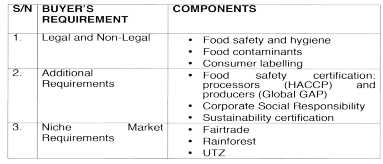By Joe ITAH
That the world economy is driven by knowledge and technology with some developed countries of the world running trillion dollar economies lends credence to the fact that Nigeria more than ever before needs to diversify its economy from dependent on oil to non-oil.
This is more so when one juxtaposes our economy with that of countries like India, Malaysia, Singapore and lately United Arab Emirates (UAE) just to mention a few, that have repositioned their economies using the non-oil platform complemented with cutting-edge technology to become economic giants competing in global business and trade.
It is therefore cheery to note that given the fragile nature of the economy, no thanks to dwindling oil revenues, among other infrastructural constraints, the present administration has put in place measures that would help stimulate massive diversification of the economy through agriculture and solid minerals development.
As the Nigerian Export Promotion Council (NEPC), an agency of the Federal Government saddled with the development and promotion of non-oil exports, continues to drive the diversification process, effort to reposition the country’s Cocoa export with a view to increasing production and meeting the requisite internationally accepted standards for export into EuropeanUnion and the US is gradually yielding results.
Only recently, the commodity which is also one of the 13 National Strategic Export Products (NSEP) of the Federal Government of Nigeria and very prominent in the NEPC’s Zero Oil Plan initiative has now been integrated into Government’s Economic Recovery and Growth Plan (ERGP), 2017-2020. Presently, cocoa is the leading major agricultural export of Nigeria.
However, the country is losing its global ranking, due to poor production practices and non-compliance to Importing Countries’ Requirements among others. As at 2015, while Cote D’Ivore and Ghana boast of production level of about 1.7 million metric tons and 800,000 metric tons, respectively, Nigeria’s production still hovers around 220,000 to 250,000 metric tons, yearly.
It is estimated that by the year 2019, the global cocoa market will be worth $2.1 billion and Chocolate market $131.7 billion. The question then is how do we reposition the Nigerian cocoa industry to reap the huge benefits in the global market? With his untiring resolve to grow the sector, the Executive Director/ CEO of NEPC, Olusegun Awolowo, initiated the Zero Oil Plan (ZOP) thereby providing a platform for the Council to address the slide of Nigeria in the global cocoa trade among other exportable products.
This led to its collaboration with the Centre for Promotion of Imports from Developing Countries to Europe (CBI) in Netherlands to train some cocoa exporters and provide direct access to the EU market. Furthermore, to gain access to the premium USA cocoa market, the Council sponsored a team of MBA students of University of California at Los Angeles (UCLA) USA, to understudy the demand and supply situation of Nigeria Cocoa in the US market.
The outcome of this collaboration and research is the need for Nigeria to increase its cocoa production as well as improve its quality to conform to global market requirements. Furthermore, there is the need to address the issue of low quality and poor packaging in order to have access to cocoa import markets.
In a bid to address some of these identified constraints in Cocoa Value Chain, the Council organized a Capacity Building Program for farmers, merchants and exporters as part of collaborative effort with the Cocoa Association of Nigeria (CAN), to acquaint them with current quality trends and issues that, conform to buyers’ requirement in the European and USA cocoa markets.
Besides, the forum provided stakeholders with a global outlook for Nigerian cocoa with specific focus on the international market requirements and appropriate pricing templates.
The objective of the capacity building programme which was held in Ikom, Cross Rivers State and Umuahia in Abia State, respectively, was among others to: Avail the practitioners with the international buyer’s requirement for cocoa beans and cocoa products, which are classified into three (3): It is, however, disheartening to note that Cocoa which has remained Nigeria’s leading nonoil export product, contributing about 36% of non-oil exports, has continued to record a decline due largely to quality issues, therefore, reducing Nigeria’s stake and share, globally. Activities anchored on best practices across the cocoa value chain will ensure that the Council’s Zero-Oil Plan initiative in which cocoa occupies a leading position is poised to reposition the Nigerian cocoa sector globally.
Joe ITAH Head, Corporate Communications NEPC, Headquarters Abuja


